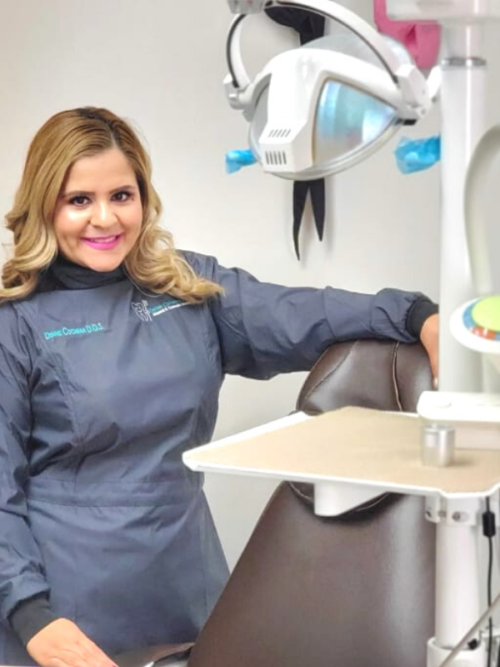Sign up to begin the "X-ray & Evaluation" process with Dr. Dennis!
The following steps will take place once you send your name & email...

Root Canal
A toothache or an abscessed tooth is terribly inconvenient not to mention painful; it may be difficult to eat, speak, or even function.
You'll need an antibiotic to calm it down before it becomes completely unbearable.
The dentist cannot work on it until the infection is down to a minimum, you won't want to wait as it will only get worse.
Infection in your mouth can lead to far more serious things, so please be careful if you have a toothache.
Wondering if you Need a Root Canal? The answer: Not necessarily.
Your tooth may hurt for several reasons:
Each scenario may be treated without a root canal, however, there are times when a root canal is your only option.

In any case, the infection needs to be controlled with an antibiotic and at the same time get an appointment scheduled as soon as the antibiotic has time to take affect.
Wondering if you Need a Root Canal? The answer is - not necessarily.

Once Dr. Dennis does an x-ray and evaluation; she will know exactly what is needed.
If the pain is intense, and the cavity is below the gum line near the nerve, you may need a root canal.
A root canal is needed when the pulp beneath your tooth, becomes infected or damaged beyond repair.
A root canal will save your tooth from being pulled.
If your situation is beyond a root canal, you may need a tooth extraction, an implant, or a bridge.
Dr. Dennis will explain in more detail the specific restoration plans or options for your teeth.
Common Questions About Root Canal Procedure
A root canal sounds scary, but with today's technology, it's typically not much different than having a deep filling. There's little to no pain because your dentist will use local anesthesia to numb your tooth and gums so you're comfortable during the entire procedure.
A specialist removes the infected pulp and nerve in the root of the tooth, cleans and shapes the inside of the root canal, then fills and seals the space. Afterward, your dentist will place a crown on top of your tooth to protect and restore it to its original function.
After root canal therapy, the tooth is dead. The patient will no longer feel any pain in that tooth because the nerve tissue has been removed, and the infection has been eliminated.
Once the inflamed or infected pulp is removed and the tooth is carefully cleaned and disinfected, it is filled and sealed with a rubber-like material called gutta-percha.
Root canal treatment is usually successful at saving the tooth and clearing the infection. About 9 out of 10 root-treated teeth survive for 8 to 10 years. Having a crown fitted to the tooth after root canal treatment is important for improving tooth survival rates.
You may experience mild discomfort after the numbing medication wears off after a root canal. If so, you may only require over-the-counter pain medications such as Tylenol, Ibuprofen, Advil, or Motrin IB. Dr. Dennis may give you a mild pain reliever in case you have sensitivity.
You may experience very mild sensitivity for a few days at most.
Rest always helps any healing process and helps you recuperate. We recommend taking it easy for about 24 hours after your treatment.
Since swelling is common after a root canal, an ice pack will help reduce it. When sleeping, keep your head elevated with pillows so you can avoid irritation. Plan your meals carefully for the first few days. Consider things that make it easier to get proper nutrition without a lot of chewing. Try not to eat anything on that side until you've healed.
It may be necessary to have a root canal if the pulp in your tooth becomes inflamed or infected as a result of deep decay, repeated dental procedures, faulty crowns or a crack or chip in the tooth. Dr Dennis will know for sure after your x-ray and evaluation.
An untreated root canal is a severe infection. It will become very painful and an abscessed tooth is dangerous. In some cases, even lead to a septic infection. When it comes to infected pulp tissue, if you are not a candidate for a root canal or you don't want one, your only option is to have the infected tooth pulled (extracted).
The typical range for a root canal in the US ranges between $900 - $1500, but in Mexico with Dr Dennis you'll pay less than 1/2 of the lowest cost.
SERVICES & TREATMENTS
Testimonials
My fillings were old, Dr. Dennis had to do a root canal. I drove and parked at the border then walked across. After my appointment, I felt fine. She is a very kind and loving person who makes you feel very comfortable. I saved a lot of money, not exactly sure how much. I felt safe in Algodones. Her staff is also very good at what they do and very accommodating. Dr. Dennis is a very good dentist and I would highly recommend her. Canada
I had an abscessed tooth, and my fillings had fallen out during COVID; no dentist (not even emergency would work on my teeth, they were happy to pull them through. I said, no way! During that time my fillings were falling out; while eating I'd accidentally bite down and break another tooth. Without proper treatment for several months, the issues worsened. Dr. Dennis did 3 root canals and 9 crowns. My teeth look and feel amazing now! The experience was awesome! Dr. Dennis is a very good dentist, thorough, gentle, friendly, and works super fast even though nothing seemed rushed, she accomplished so much in so little time. Her team, Martha & Margot, are both fantastic too! Los Algodones is very safe with many Americans & Canadians traveling there for dental & medical treatments. Her dental clinic is spotless, she takes great measures to keep her clinic safe with mask wearing for COVID standards. What I saved by going there, including airfare, lodging, food, Uber, and other expenses, I saved about $27,000.00! I will happily go again for any dental work. If you need dental work, don't even hesitate; schedule an evaluation now! :)
The Evaluation consists of: All x-rays and a complete dental examination with Dr. Dennis
The fee for your evaluation will be reimbursed if you elect to have a dental procedure - if one is recommended.